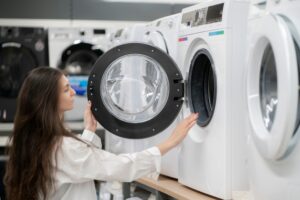When it comes to choosing a new dryer, one of the most common questions homeowners face is whether to go with an electric or gas model. Each type has its own set of advantages and disadvantages, and the best choice often depends on your specific needs and circumstances. In this post, we’ll break down the key differences between electric and gas dryers to help you make an informed decision.
Energy Efficiency and Cost
Electric Dryers:
- Initial Cost: Electric dryers are generally less expensive upfront compared to gas dryers.
- Operating Cost: Although electric dryers tend to have a lower initial cost, they can be more expensive to operate in the long run. This is because electricity rates are typically higher than natural gas rates.
- Installation: Electric dryers are easier to install since they only require a standard 240-volt outlet. Most homes are already equipped with the necessary electrical setup.
Gas Dryers:
- Initial Cost: Gas dryers usually have a higher purchase price than electric dryers.
- Operating Cost: Gas dryers are generally more cost-effective to operate due to the lower cost of natural gas compared to electricity. Over time, the savings on energy bills can offset the higher initial investment.
- Installation: Installing a gas dryer is more complex and expensive. It requires a natural gas line and proper ventilation, which might not be available in all homes. If these installations are necessary, they can add to the overall cost.
Performance and Drying Time
Electric Dryers:
- Heat Generation: Electric dryers use electric heating elements to generate heat, which can take longer to reach optimal drying temperatures.
- Drying Time: As a result, electric dryers typically have longer drying times compared to gas dryers. However, advancements in technology have improved their efficiency significantly.
- Temperature Control: Electric dryers generally offer more precise temperature control, which can be beneficial for drying delicate fabrics.
Gas Dryers:
- Heat Generation: Gas dryers use a gas burner to produce heat, which heats up faster than electric elements.
- Drying Time: The quicker heat-up time results in faster drying cycles, which can be a significant time saver for busy households.
- Temperature Control: While gas dryers are very effective at drying clothes quickly, they may not provide the same level of temperature precision as electric dryers.
Environmental Impact
Electric Dryers:
- Energy Source: The environmental impact of an electric dryer largely depends on the source of the electricity. If your local grid relies heavily on renewable energy, an electric dryer can be a more eco-friendly option.
- Emissions: Electric dryers produce no direct emissions, making them a cleaner option in terms of immediate environmental impact.
Gas Dryers:
- Energy Source: Natural gas is a fossil fuel, and burning it releases carbon dioxide and other pollutants. However, natural gas is generally considered to be a cleaner fossil fuel compared to coal or oil.
- Efficiency: Gas dryers are typically more energy-efficient than electric dryers, which can partially offset their environmental impact.
Maintenance and Longevity
Electric Dryers:
- Maintenance: Electric dryers tend to require less maintenance since they have fewer complex parts compared to gas dryers.
- Longevity: The lifespan of an electric dryer is often slightly longer than that of a gas dryer, primarily due to the simplicity of its heating mechanism.
Gas Dryers:
- Maintenance: Gas dryers may require more frequent maintenance, including regular checks of the gas line and ventilation system.
- Longevity: Despite potentially higher maintenance needs, gas dryers are known for their robust performance and durability.
Safety Considerations
Electric Dryers:
- Risk: Electric dryers are generally considered to be safer as there is no risk of gas leaks. However, improper installation and maintenance can still pose fire hazards.
- Installation: Ensure that the electrical connections and outlet are up to code to prevent electrical fires.
Gas Dryers:
- Risk: Gas dryers carry a risk of gas leaks, which can be hazardous. Proper installation by a professional and regular maintenance are crucial to minimize this risk.
- Ventilation: Proper ventilation is essential to prevent the buildup of carbon monoxide, a dangerous byproduct of gas combustion.
Conclusion: Which is Better?
The choice between an electric and gas dryer ultimately depends on your specific needs and circumstances. If you are looking for a dryer with a lower upfront cost, easier installation, and more precise temperature control, an electric dryer may be the best choice for you. On the other hand, if you prioritize lower operating costs, faster drying times, and higher energy efficiency, a gas dryer could be the better option.
Consider factors such as your budget, the availability of a gas line, your local energy costs, and your household’s drying needs. By weighing these factors carefully, you can make an informed decision that will best suit your home and lifestyle.
For professional advice and installation services, don’t hesitate to contact us. We’re here to help you find the perfect dryer to meet your needs.

